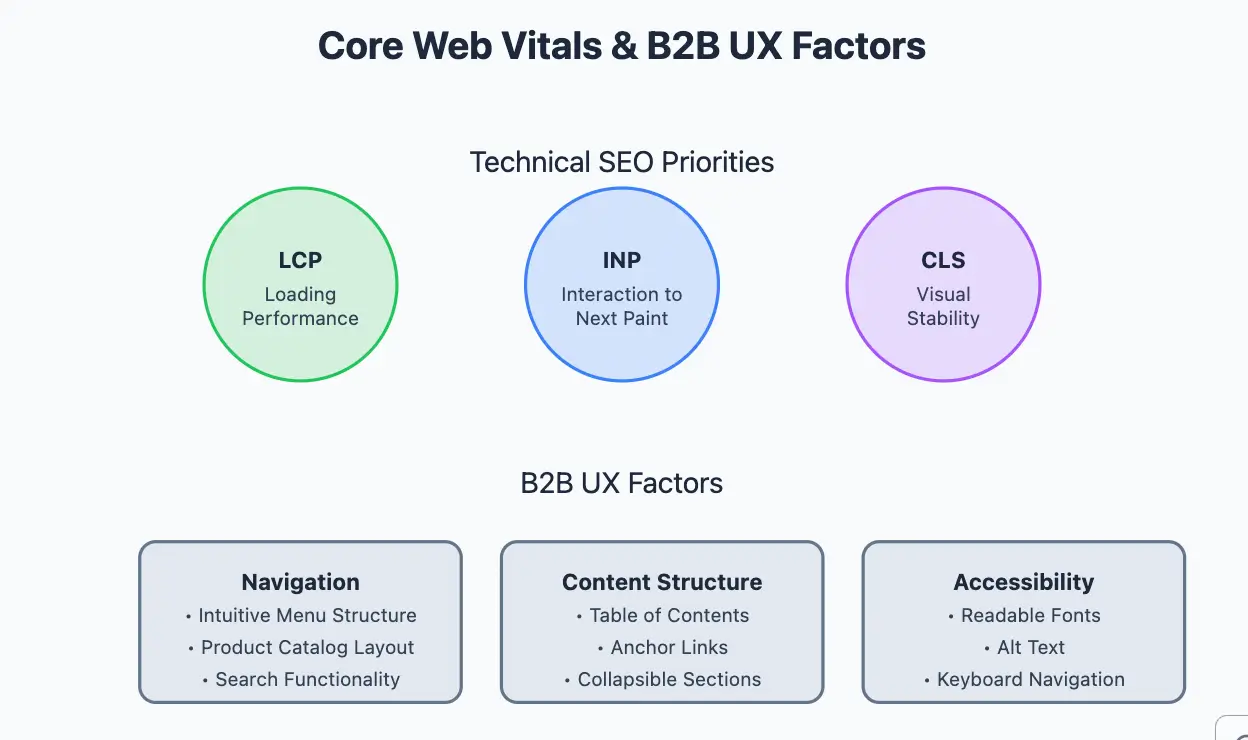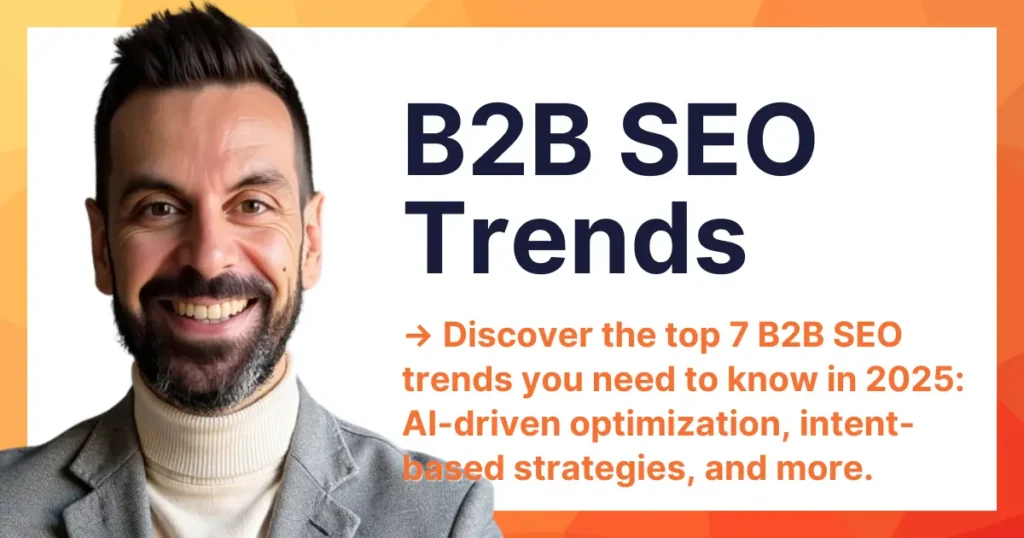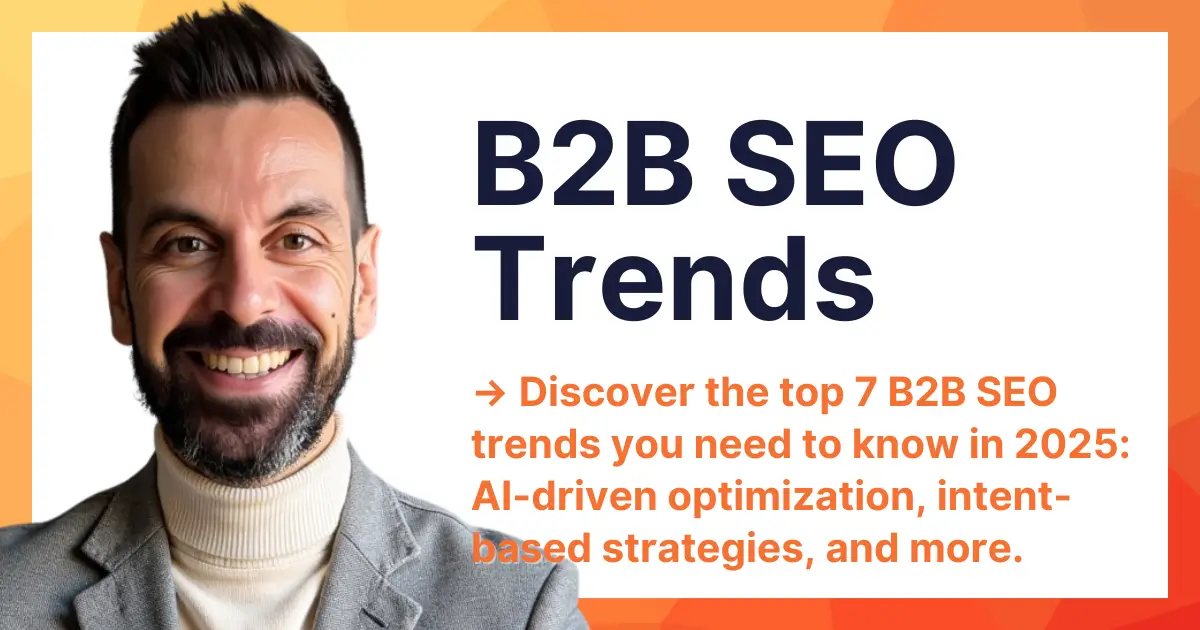As a B2B SEO consultant, I’m often asked about the next trends in this SEO niche. The B2B SEO landscape in 2025 looks markedly different than it did just a few years ago. Search engines evolve and buyer behavior grows more complex, so digital marketers need to adapt their strategies to remain visible. The shift from basic keyword placement to intent-driven, AI-assisted optimization reflects a broader industry move toward quality, relevance, and trustworthiness.
Staying current with B2B SEO trends is not optional: professionals need to understand the shifts in technology, algorithmic enhancements, and audience expectations. This way, you equip your brand with the right tools to outpace competitors and capture high-value leads. Unlike B2C SEO, where impulse decisions are common, B2B buyers undertake longer research cycles, demand technical depth, and prioritize problem-solving content—making it crucial to stay ahead of the latest search optimizations.
Trend #1: The Rise of AI & Machine Learning in B2B SEO
AI-powered content optimization
In 2025, generative AI has significantly influenced how brands produce and refine content. Marketers now leverage advanced AI tools to perform keyword research, identify topic clusters, and suggest content outlines—quickly aligning content with the latest B2B SEO trends. However, successful B2B content still requires human insight to add depth, industry knowledge, and authentic thought leadership.
AI-driven platforms help streamline the creation of whitepapers, technical documentation, and data-driven reports. By integrating AI in your workflow, you can efficiently scale content production without sacrificing quality. The key is to use AI-generated insights as a starting point, then enhance the material with human expertise for authenticity and credibility.
Machine learning’s influence on search algorithms
Machine learning-powered algorithms like RankBrain continue to refine how search engines interpret content. For B2B SEO, this means that relevance and context are just as important as keywords. Content strategies must now consider the entire buyer journey, tailoring resources to address complex, niche industry questions.
To adapt, ensure your site architecture, content updates, and internal linking strategies reflect a deep understanding of your target audience’s needs. Over time, machine learning algorithms reward B2B sites that continuously deliver valuable, context-rich materials, positioning them as go-to authorities in their fields.
Trend #2: Intent-Focused SEO Strategy
Evolution of search intent in B2B
In 2025, Google and other search engines prioritize intent over simple keyword matches. It means that B2B SEO keywords are not just keywords anymore. Current B2B SEO trends emphasize uncovering what motivates your audience—whether they seek product comparisons, in-depth research, or solutions to specific pain points. Intent-focused strategies mean understanding if visitors want information, are evaluating solutions, or are ready to transact.
By mapping out these intent stages, you can create content that anticipates your audience’s questions and guides them through the funnel. Ensuring that your content aligns with intent helps establish trust, keeps potential buyers engaged, and shortens the decision-making cycle.
Long-form technical content
B2B buyers crave depth and expertise. In response, long-form technical content, such as comprehensive guide pages, interactive how-tos, and research-backed reports, have become cornerstone assets. These materials highlight your subject matter expertise, reinforcing trust and authority in competitive niches.
Consider using structured headings, tables, and bullet points to break down complex topics into digestible sections. This approach not only improves readability but also satisfies algorithmic preferences for well-organized content, ultimately strengthening your presence in B2B SEO trends.
Trend #3: Mobile-First Optimization for B2B
Mobile search behavior in B2B decision-making
Mobile-first optimization has long been a B2C focus, that’s true. But B2B buyers also increasingly rely on smartphones and tablets. In fact, surveys show that in 2025, over 60% of B2B researchers conduct initial fact-finding on mobile devices. This shift impacts how prospects discover and engage with complex product information, whitepapers, and case studies.
By investing in mobile-optimized landing pages, user-friendly navigation, and simplified forms, you make sure that valuable leads aren’t lost due to clunky mobile experiences. The more seamless the journey, the higher your conversion rates and the stronger your position in B2B SEO trends.
Technical requirements
Technical optimization is essential for mobile performance. Fast loading times, responsive design, and adaptive images all contribute to meeting modern mobile standards. Tools like Mobile-Friendly Test can guide improvements, ensuring your site passes Core Web Vitals metrics and stays competitive in a mobile-first world.
Make sure your CTAs, demo request forms, and other conversion elements remain easily accessible and intuitive on smaller screens. This attention to detail improves both user satisfaction and your rankings.
Trend #4: User Experience and Core Web Vitals
Technical SEO priorities
Core Web Vitals—loading speed, interactivity, and visual stability—now shape search rankings in tangible ways. In B2B SEO trends, these metrics are critical since buyers often engage with lengthy reports, complex product pages, and interactive demos. Ensuring smooth navigation keeps prospects engaged longer and signals quality to search engines.
Address technical issues early. Minify code, leverage browser caching, and optimize image sizes to ensure your pages load swiftly. A technically sound site correlates closely with user satisfaction, ultimately leading to improved search visibility.
B2B-specific UX factors
B2B websites frequently host complex product catalogs, partner portals, and integration docs. Intuitive navigation, robust search features, and clear filtering options help visitors quickly find the resources they need. Consider including anchor links, table of contents widgets, and collapsible sections for lengthy technical content.
Additionally, pay attention to accessibility. Offering readable fonts, descriptive alt text, and keyboard-friendly navigation ensures all potential buyers can engage with your content, further supporting your B2B SEO efforts.

Trend #5: Video and Visual Content SEO
Video optimization strategies
Video content continues to surge in popularity, and B2B SEO trends now emphasize optimizing videos for both visibility and engagement. Including transcripts, closed captions, and schema markup ensures search engines understand your video content. Platforms like YouTube, LinkedIn, and industry-specific video hubs offer opportunities to reach decision-makers where they already spend time.
Embedding videos in product pages or blog posts can increase time-on-site, demonstrating to search engines that your content is valuable and user-friendly. When supplemented by transcripts and keyword-rich descriptions, video assets become a powerful SEO lever.
Visual content for B2B
Data visualizations, technical diagrams, and infographics simplify complex concepts. These visuals can break down intricate product features or highlight key metrics in an annual report. Alt text and descriptive filenames help search engines index your visual elements, improving your overall discoverability.
When creating visual content, maintain brand consistency and clarity. Relevant visuals add authority and help communicate intricate ideas to both technical and non-technical stakeholders alike.
Trend #6: E-E-A-T and Authority Building
Establishing expertise
E-E-A-T (Experience, Expertise, Authoritativeness, Trustworthiness) standards play a central role in B2B SEO trends. Demonstrating expertise through thought leadership content, detailed documentation, and industry recognition helps you stand out. Highlight the credentials of your authors, reference reputable studies, and showcase industry awards or certifications.
Building a content library that delves deeply into niche topics fosters trust. Over time, consistent quality content makes your site a go-to resource, positively influencing your search performance.
Trust signals
B2B buyers look for proof that your solutions work. Displaying case studies, testimonials, and data-driven success stories enhances credibility. Third-party validations, like partnerships, media mentions, and compliance certifications, further reinforce trust.
By making trust elements visible throughout your site and linking them to authoritative pages, you bolster your E-E-A-T profile and encourage prospects to engage with your brand at a deeper level.
Trend #7: Data and Analytics Become Serious
Advanced tracking methods
In 2025, advanced tracking goes beyond basic analytics tools. B2B SEO trends now focus on integrated attribution models, cross-device tracking, and CRM integrations to connect marketing efforts with revenue outcomes. This holistic view allows you to tailor content more effectively and prioritize channels that yield the best ROI.
Robust analytics platforms provide insights that empower data-driven decisions. By understanding your users’ paths, you can allocate resources where they have the greatest impact.
Performance measurement
B2B sales cycles are longer and more intricate than B2C. Tracking micro-conversions—like newsletter sign-ups, resource downloads, and demo requests—helps measure progress even before a deal closes. KPIs like pipeline influence, customer lifetime value, and lead quality offer a more nuanced understanding of your SEO’s effectiveness.
| Metric | Description | Purpose |
|---|---|---|
| Lead-to-Opportunity Rate | Percentage of leads that become qualified opportunities | Measures lead quality |
| Customer Lifetime Value (CLV) | Revenue gained over a client’s lifecycle | Justifies SEO investments |
| Pipeline Influence | SEO’s direct impact on deal creation | Aligns SEO with sales |
How To Prepare Yourself?
Emerging technologies
Beyond the established B2B SEO trends, new technologies like blockchain, AR/VR search experiences, and sophisticated marketing automation tools are poised to reshape digital discovery. Monitoring these advancements ensures you remain proactive rather than reactive.
Test pilot programs with emerging tech to gauge ROI and feasibility. Early adoption can lead to a competitive edge, making your brand stand out as an innovator in the B2B space.
Strategy adaptation
Building flexible SEO frameworks prepares your team for future changes. Allocate resources to R&D, experiment with new platforms, and continuously upskill your team. By evolving your approach and staying open to new opportunities, you’ll maintain strong search visibility in an ever-shifting landscape.
Conclusion
In 2025, B2B SEO trends demand a forward-thinking approach. Adopting AI-powered optimizations, focusing on user intent, refining mobile experiences, and meeting Core Web Vitals standards all influence how your brand ranks and resonates with buyers. Elevating trust signals, leveraging video, and refining data-driven analytics further set you apart.
By acting on these insights today, you ensure that your B2B brand not only adapts but thrives. Implement new tools, enhance content strategy, and continually test and refine your tactics. The winners in B2B SEO will be those who embrace change and drive continuous improvement.
Additional Resources
You can use reputable tools and communities to deepen your expertise and stay current with the latest B2B SEO trends:
- Tools & Platforms: SEMrush, Ahrefs, Google Search Console, Screaming Frog
- Industry Research: HubSpot’s B2B Marketing Reports, Forrester Research, Gartner Insights
- Expert Communities: LinkedIn Groups, Specialized Slack Channels, SEO-focused Forums
You can also learn more with these articles:
- How to Do B2B SEO [Trends & Best Practices] (HubSpot)
https://blog.hubspot.com/marketing/b2b-seo
Outlines evergreen B2B SEO strategies likely to remain relevant. - The Definitive Guide to B2B SEO (Search Engine Journal)
https://www.searchenginejournal.com/b2b-seo/
A thorough guide detailing specific tactics and trends for B2B marketers. - B2B Content Marketing: Insights for 2023 (Content Marketing Institute)
https://contentmarketinginstitute.com/2023-b2b-content-marketing
Highlights data and trends in B2B content marketing, which directly impact SEO strategy.














